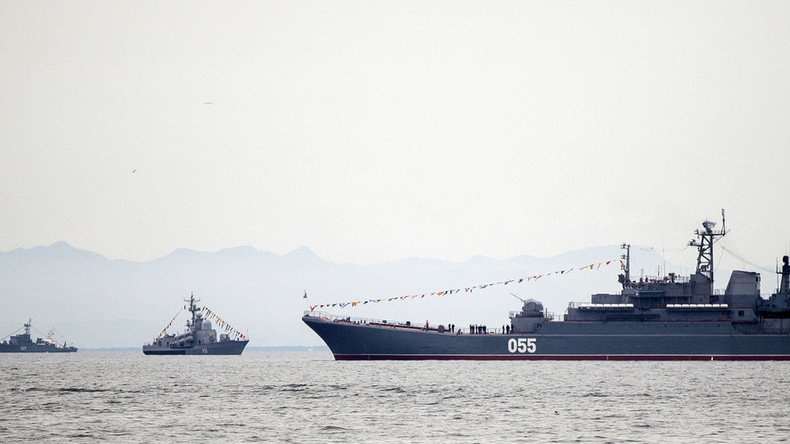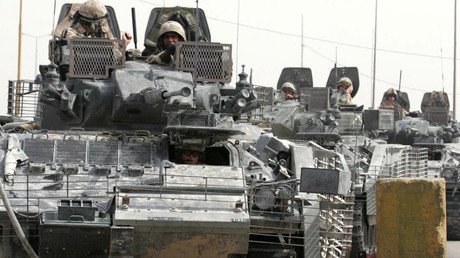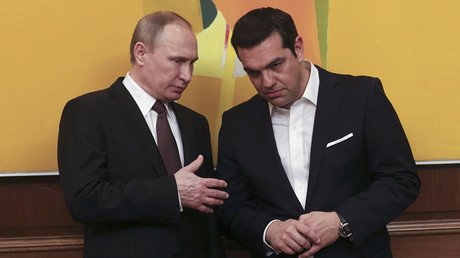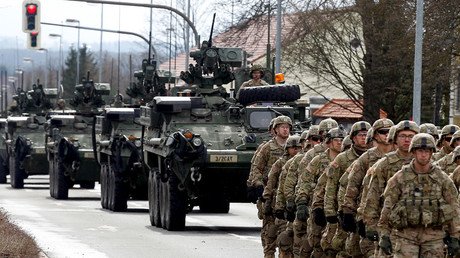Spain ‘betrays NATO allies’ hosting Russian warships – oh, really?

Looks like Spain is in trouble. The country has been slammed for “betraying its NATO allies” allowing Russian Navy vessels to refuel in its North African territories – but in reality what the claim does is expose a massive web of hypocrisy.
Since 2011, Spain has rankled NATO by allowing 57 Russian warships, submarines and other vessels to refuel at its North African enclave of Ceuta, according to a report in the Times. Now the issue has been highlighted by US Congress after Republican Congressman Joe Pitts proposed an amendment to the annual defense bill which would require defense officials to “report on NATO countries that allow Russian warships to dock at their ports.”
Pitts is not a happy camper at all. Spain’s actions “undermine NATO’s solidarity”against Russia, while governments “across the globe” should be “isolating the Russian Navy, not accommodating it”, he writes.In fact, he goes on, NATO should have a “cohesive strategy” to deny Russia access to warm water ports.
American exceptionalists are worried that US “disengagement” from the Mediterranean has presented an opportunity to Russia, which maintains a strategically crucial Mediterranean base at the port of Tartus in Syria.
European Disunion
But the fact that NATO has essentially frozen relations with Russia and that the European Union has imposed economic sanctions on the country hasn’t stopped NATO and EU countries from allowing Russian ships to use their Mediterranean ports for resting, refueling and restocking.
Malta, an EU member has also played host to Russian ships. Greece, which has continued to maintain friendly relations with Russia while also being member of both NATO and the EU, has done the same. It is believed Russia is also seeking the right to use ports in Cyprus. But according to Luke Coffey, an analyst at the Washington-based conservative think tank The Heritage Foundation, of all the traitors to NATO, Spain is “the worst”. Spain’s behavior is “irresponsible” particularly at a time when Russia is actively attempting to “dismember” Ukraine, he says.
Leaving aside Coffey’s obvious lack of nuanced knowledge or expertise on the Ukraine crisis, there is one thing he’s right about: The issue reveals how divided Europe really is over its policy towards Russia. The “united front” is more like a flimsy facade, with countries reluctant to spoil their own individual relations with Moscow for the sake of a grand strategy of containment which may not really be to their benefit, particularly if there is a thaw in relations – however unlikely that may appear today.
Who’s undermining who?
For years the NATO alliance has been adamant that it is not focused on Russia and is not a threat to anyone. US Secretary of State John Kerry assured everyone last December that NATO is a “defensive alliance” and is “simply meant to provide security” to its members. It is “not focused on Russia or anyone else,” he said. NATO spokesperson Oana Lungescu has echoed Kerry’s comments, “categorically” denying that the bloc’s expansion has anything to do with Russia. This despite the fact that on other occasions, US and NATO officials have hyped Russia as one of the gravest threats to humanity.
So, if we are to accept the notion that NATO’s policies have nothing to do with Russia specifically, then it shouldn’t be a problem for a sovereign country – in this case Spain – to make the independent decision to allow the refueling of Russian vessels at one of its ports, if the stops are made with full permission in compliance with international and domestic law – which by all accounts, they are.
On the other hand, if we are to accept the idea that Spain’s decision does in fact “undermine” NATO solidarity, it also must follow that Sweden’s decision to become a “host nation” to NATO troops would also undermine its so-called “non-aligned” status. It must also follow then that Ireland’s almost daily hosting of US military planes at Shannon Airport (a breach of international neutrality law) would undermine its so-called “neutrality”– but neither Pitts nor Coffey seem bothered by that.
The Hypocrisy Olympics
When introducing the amendment to require officials to report on NATO countries allowing stops by Russian ships, Pitts cited the Russian “invasion” of Crimea as one of the reasons the Russian Navy should be shunned.
It’s somewhat ironic then that there are not one, but two territorial disputes that are a tad more relevant to the issue at hand here, but seem to have gone unnoticed. The territory of Gibraltar is controlled by Britain, but claimed by Spain – and the Ceuta enclave is controlled by Spain, but claimed by Morocco.
So we now have British officials kicking up a fuss over Russian ships docking 20 miles away from their own, which in turn are docked at a port which Spain believes rightfully belongs to them – and all the while they use a completely unrelated territorial dispute to back up their claim that the Russian ships have no right to be there. You couldn’t make it up.
The real dispute in the Straits of Gibraltar is between two NATO countries themselves, the UK and Spain. A spokesperson for the Government of Gibraltar told the Express that Spanish ships were “harassing” US and Royal Navy assets operating in the area. The matter became so tense earlier this month that the Royal Navy fired warning shots at a Spanish vessel that had approached a US nuclear submarine off the coast of Gibraltar. Whew. No wonder everyone’s finding it more convenient to make Russian ships the issue.
Anyway it gets even better, or worse, depending on how you want to look at it.
Last month, British Foreign Secretary Philip Hammond told Vietnam that claimants in the South China Sea must not send troops to “disputed maritime” areas. Hammond, not known for his use of logic in international affairs, might want to reconsider that suggestion, given that his own country has militarized a number of disputed maritime areas itself – including Gibraltar, the Falkland Islands and the Indian Ocean island of Diego Garcia.
Moral of the story: NATO ships and planes can dock or land pretty much anywhere, at any time, without question – and territorial disputes are only important if they involve Russia, but not when they involve NATO members themselves.
Got it?
The statements, views and opinions expressed in this column are solely those of the author and do not necessarily represent those of RT.
















